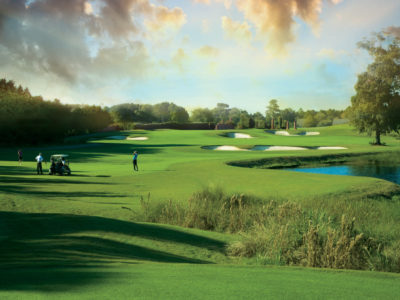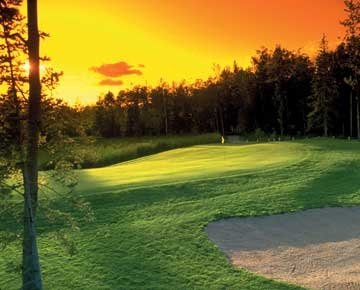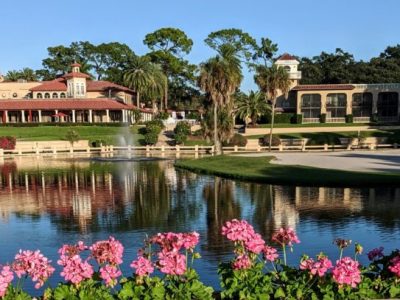By Mike May
While world-renowned golf course architect, Pete Dye was born in Ohio and is famous for designing some of the most ‘dye-abolical’ courses in the world. The Stadium Course at TPC Sawgrass, host of the The Players Championship, the Ocean Course at Kiawah Island, site of the 2021 PGA Championship, as well as, many more recognizable names. One of Dye’s least known efforts is his very first one, The Maple Creek Golf and Country Club, located on the northeast side of Indianapolis. His very first 18-hole design.
Originally opened as Heather Hills Golf and Country Club in 1961, Maple Creek was created in partnership with his wife, Alice. It features small tees and greens, narrow fairways lined with mature trees and natural long grass areas. Multiple bunkers compliment a creek that winds its way through the front nine, which raises the bar, so to speak, for players of all skill levels.
The first green at Maple Creek Golf & Country Club. 
According to Jim Grossi, Maple Creek’s general manager and head golf professional, Pete Dye designed a golf course that will remain forever relevant and never go out of style.
“Maple Creek is a picturesque, traditional and classical setting defined by challenging yet rewarding design features,” states Grossi.
If you are searching for evidence that Pete Dye had a role in designing this golf course, you simply need to examine how the putting surfaces were built.
The approach shot to the 13th green at Maple Creek.
“By far, our greens tell the story of Pete Dye and are a preserved piece of history,” adds Grossi. “You will find these original design features prominent in Mr. Dye’s later career work.”
While all 18 holes at Maple Creek are creative designs, the signature hole is the par-five 13th.
“At 13, you fill find great optical design features from the teeing ground as well as the second and optional third shot approach,” reveals Grossi. “This green (at 13) challenges even the most achieved golfer.”
While the 13th hole may be Maple Creek’s signature design, the most memorable shot takes place late in the back nine.
“The view from the 16th tee box boasts one of the most picturesque views in the state of Indiana,” says Grossi.
While Pete Dye designed this great golf course, Gross says that his superintendent is going a great job of preserving Dye’s legacy.
“Our superintendent Steve Conlin has always done a tremendous job preserving and manicuring the greens,” says Grossi. “Most notable, this year we have dedicated capital towards a property wide tree-grooming project. The sole purpose is to return the sight lines from tee-to-green that Mr. Dye had originally planned and designed.”
While Maple Creek is an entertaining destination for golfers, it’s also an appealing destination for golf historians, specifically those who are interested in the golf course designing career of Pete Dye. In many respects, the Maple Creek clubhouse could also be called the Pete and Alice Dye Museum as Maple Creek’s clubhouse is a lasting memorial to their work. Both Pete and Alice were named honorary life members of the club in 1991.
“It’s our job to tell their story,” said Joe Lorenzano, Maple Creek Golf and Country Club’s membership director.
Part of the tribute to Dye starts with the name given to the restaurant inside the clubhouse, Pete Dye’s Pub.
Their website accurately describes Maple Creek as “A hidden gem on the Eastside.” This layout is also described as “A shot maker’s course that cannot be overpowered.”
Maple Creek is also one of seven courses that are part of Indiana’s Pete Dye Golf Trail.










